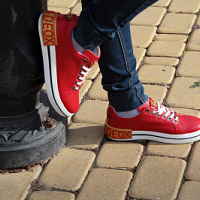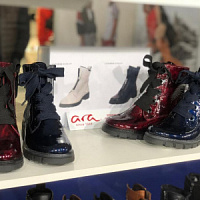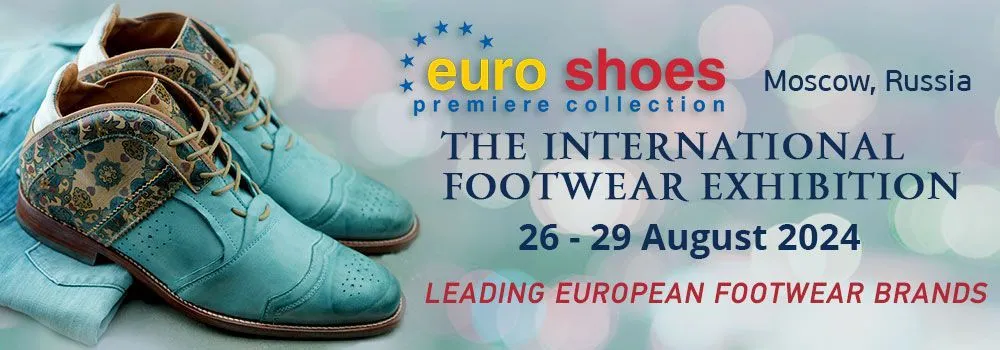
Andrey Berezhnoy: "The shoe retail crisis is systemic in nature"

At the conference, Adam Smith RALF RINGER CEO Andrei Berezhnoy said the crisis in shoe retail was predetermined and that this crisis is systemic. SR decided clarify some details.
— Andrey Alexandrovich, crisis margins - is it a crisis of greed?
- No, no, no, by no means. The crisis of margin is a crisis of three components. It was formed due to the fact that the retail offer was excessive, the supply of square meters was excessive, and the price tag was really overpriced. How can events develop further in such a situation? Prices are rising, sales are falling, prices have to be raised even more (to compensate for the decrease in revenue due to falling sales), sales (due to rising prices) are falling even more. Dead end! Plus, the situation was aggravated by the fact that in many cities all stores sell about the same thing, which means that you can only manage the price tag.
— And why we there is such a situation that the retail offer has become redundant?
- There are many reasons. Why is it so in shoes? Perhaps because shoes in Soviet times were the most scarce goods. My dad during the Olympics in 1980 traveled from Zaporozhye to Moscow, returning, he said that in Moscow there is everything except shoes and books. In Zaporozhye itself, we had only one (!) Shoe store in the 50 microdistrict, although there were three bookstores (and books in the USSR were also in short supply). Maybe due to the fact that there was a special shortage in shoes, everyone was lazy here.
In the 2000's, shoe trade was highly marginal - this is the second reason for the surplus that has appeared. And finally, the absence of large federal players in the market could not reduce competition. Apparently, this will happen now.
— But many stubbornly say Aboutthat major players exactly in shoe trade to appear can not.
- They can. Sooner or later, the market is systematized. As in Germany - there are chain stores and monobrands.
— And How overcome margin crisis?
- Either through an increase in circulation for the model, or through another assortment (most likely, of lower quality, and hence lower cost). The third way is also obvious - improving the service, but for some reason it is rarely used. Our retail does not work with the buyer!
How does retail work? She has a limited circle of suppliers that depend on her. And there is a large circle of buyers who are not dependent on it. Wanted - bought, did not want to - went to another store. It is quite difficult to achieve customer confidence, their loyalty. Therefore, instead of thoughtfully setting up work with the buyer as a source of revenue, retailers prefer to press suppliers. And we need cooperation.
We have now started a dialogue with Sportmaster, there are constructive people, qualified retailers. They understand what they need, they clearly know the threshold price, they choose the styles correctly. Everything is reasonable. If we can prove to them that we are qualified manufacturers, then we can work together. But we are ready to work with all retailers on this principle.
So far it turns out differently: “You have 130 stores. We are ready for you to sew shoes exactly no more expensive than the Chinese. Let's negotiate. ” But in response, we hear: "We do not buy more 800 pairs per model." It turns out six pairs per store. One size range! What is it like?
-That is, we rest at thatthat sellers don't count.
“Yes, and that too.” The real problem we are facing. Last fall, we made a new Louis style: a good rubber sole, a good upper, and a reinforced concrete classic. Without much risk, three models were sent away. Our regular regional partner, a cool retailer, has chosen one model out of three. Ordered 280 models. On October 4, there were 2 pairs left in the store. All sold out. Everyone is happy. I look at the order for spring. The same model - the same 280 pairs. Why?
Let's argue purely logically: if at the beginning of October everything was already sold at the store, how much could the owner sell in November and what was her lost profit? This is a classic style, most likely it will live a long time, and you have the spring season on the nose, which is always good in terms of sales of classics. But do you order as much as you sold? Why?!
Perhaps the sellers reason on the principle: "Well, Ralph won't sell, something else will sell." But then another question arises: have you calculated the margin? How much are you taking off this shoe? In October, it cost 2800 rubles in retail, this is not a cheap thing. And from each shoe, the store owner received 1500 rubles in profit. With other models the same? I'm not sure.
— And such examples ...
- …a bunch of. You need to understand that not all problems can be solved by working with efficiency and cost, not all processes can be algorithmized - this applies to production and retail. Just shoe retail, like clothing, is a tricky thing.
— What is complicated?
- Complex in terms of determining the range, price management, determining the number of pairs per model. And it’s especially difficult now, when the end customer throws from side to side. When the leaders of one of the retail chains sit and puzzle over what to buy: because the shoes diverge for 2600 rubles, and for 1200. Both that and that is on sale. God knows. The attitude to the product has not yet settled down. However, I am sure that over time my personal experience in consumption will accumulate: when, on the one hand, some types of a person’s product will completely satisfy, while others will disappoint enough times. Then the person will say: “I do not want more experiments”, and the market will become calmer.
— How to suppliers with retailers find a common language now?
- Analysis and cooperation are the basic values for this relationship. But! .. In order for me, as a manufacturer, to make you the best offer, I need an analysis of sales in your store for all the brands that you have - model, marginal. And for some reason, Russian sellers stubbornly believe that we need this data in order to almost enslave it. However, one cannot live long on deceit and pressure. A tool to increase the effectiveness of retail and in general the main tool for developing the business of the future is cooperation.
— You are tough. With you difficult to cooperate ...
- I agree. But the rigidity in my understanding is a clearly fixed agreement with a clear implementation !!!
Otherwise, this is what happens. A partner is contacting us with a request to give him an exclusive in several cities. OK, I prepare and show him my idea of what an agreement on exclusive rights is, with the goals, objectives and obligations of the parties. A man reads and says: “Oh, it’s difficult for me. Let me just sell you, and I will order more next season. ” It’s also impossible. If we really want to agree on something, let's agree on this clearly and in writing.
Yes, we were tough. Well, how can convincing people to comply with the rules without rigidity, which really proved the ability to earn high income ?!
In some cases, we still remain tough. We, for example, do not accept used marriage from dealers. And this is not a question of money. This is a worldview value. Because we believe that the “end customer – retailer” relationship is as commercial as ours. And if the retailer does not defend its interests, but takes any claim back and redirects it to us, then this will be ineffective. It is clear that if we say that we made some radical mistake in the design, then the company goes to recall such a product.
The second element of a tough position: we believe that the responsibility for the results of retail sales is the responsibility of the retailer. Why in the bad season they turn to us with the question: “Could you lower the price of shoes?” After all, in a good season no one offers us: “Would you like to get 20% more?”
It is your task to know what price tag customers are guided by, how to sell it to these people, through a large retail store or through direct marketing.
If the retailer says that his task is to arrange deliveries on time, to control the cash register and personnel, everything else depends on the supplier, excellent, we agree on this option. Tell me, what is our area in the store, and we will control what we delivered, at what price and how we set it. Are you satisfied with the revenue per square meter? Yes. All bye. We do the rest. But in this case, the process has certain costs, which means that part of the margin will be ours.
My idea: in a bad season, the retailer may turn to the company with the proposal: "Let's hold joint promotions to increase sales, get rid of balances."
— And whatthere is no initiative?
- Not yet. While we initiate cooperative cooperation, only we. A customer from Orenburg is calling: “I have no sales and big balances.” We looked, the place is good. They suggested: “It’s summer, nothing will change from the fact that you will be sitting on these leftovers, declare the lowest price in the city, return the capital, come out clean, updated. And then you will begin to work quietly. ” In the end, they reached an understandable agreement and developed a step-by-step plan.
Another question is that retail is not able to organizationally and financially support the volume of orders that it expects. Therefore, we must sit down at the negotiating table: I have such and such problems because of you, and I have such problems because of you. And we can solve them this way and that. As a manufacturer, I have difficulties due to the fact that you are putting on a shelf a known competing product. And with your own hands you make a copy of our model in China. Come on, you won’t do this. And the retailer replied: OK, just come on, you, in turn, will not do this and that. And then two results should appear - the retailer’s revenue will increase. Because he wants to collect the maximum possible crop from this territory. And I want to collect the maximum possible yield for my brand from its traffic. This is cooperation.
— According to your sensations, this search for cooperation is now gone.
- Massive - no. Indeed, not everyone wants to be transparent and open, in muddy water, too, cool to catch a fish. In clear water, other rules apply.
— If sellers will not go to contact that You will do?
- We will do everything. To audit the retail network, look for new partners, develop our own retail. However, the first step will be an attempt to negotiate with existing dealers and offer them deeper cooperation. If you answer the question, what is better - to find a new dealer or to agree with the one that already exists, then we think it is better to agree. Still, predictability of human behavior, predictability of relationships is also capital.
— About what can you dream now?
- The crisis has an element of accumulated fatigue, unjustified expectations. Therefore, one can dream of preserving the strategic values of a company, a brand.
If we take the high-price segment, it was all built on the principle of “everything is expensive and cool with us”. The question is, do you need it “cool” right now. Maybe just good enough?
If consumer value, the basis for making decisions is that “I don’t think that shoes cheaper than 10 thousand rubles per pair can be good”, and we have heard such things from officials more than once, then it would be better if this value changed.
— How to instill love for citizens to Russian product?
- This is a difficult national task. But our strategy is far from the one that could solve it. Gas in exchange for food is a bad system. The whole country cannot live on gas production and trade. It is clear that customs duties are not the only way to regulate our relations with imports, but raising them at least can be a promise that we do not need so many imported products ...
... when I want to buy something or order a service, I try to do it near the house, where I live. Of course, I can find dry cleaning on the way, but I prefer to come home and find it in my neighborhood. Because I believe that if there is a dry cleaning service near my house, which is also paid by me, it will be better. I try to keep my world around me like that. And on a countrywide scale, it also needs to be supported, perhaps in the same way ...
... the current generation must invest something in the future, the purchase of a domestic product is investment in the future. If you are going to live in Russia, if you plan to have your children and grandchildren live here, then you will have to make some sacrifices in personal consumption, this is a kind of payment to future generations.
| Please rate the article |
Materials on the topic
What is the mistake of suppliers of children's shoes in working with wholesale companies

How to work with marketplaces to avoid competition between the online assortment and the offline store

Brazilian shoe manufacturers invite buyers from Russia and CIS countries to business meetings in online format

DEOX strengthens its market position

Lillian Roor, ARA Sales Director in Russia: “ARA Shoes strives to be the most high-tech manufacturer of fashionable footwear.
Popular
 Coach turned to Big Data analysis and won the interest of a young audience
American handbag brand Coach has planned the success of its Tabby model among a younger audience, Generation Z, by turning to big data analysis, abandoning traditional and analogue tools, such as human intuition or the ability of any executive to sense “which way the wind will blow,” writes B.O.F.
Coach turned to Big Data analysis and won the interest of a young audience
American handbag brand Coach has planned the success of its Tabby model among a younger audience, Generation Z, by turning to big data analysis, abandoning traditional and analogue tools, such as human intuition or the ability of any executive to sense “which way the wind will blow,” writes B.O.F.
 IDOL updates the concept
The IDOL brand, part of the Melon Fashion Group portfolio, opened the first flagship in an updated concept in the Aviapark shopping center in Moscow.
IDOL updates the concept
The IDOL brand, part of the Melon Fashion Group portfolio, opened the first flagship in an updated concept in the Aviapark shopping center in Moscow.
 Louis Vuitton opens a new factory in Italy
Louis Vuitton has opened its second shoe factory in Italy. After opening the first one in Fiesso d'Artico in Veneto, the LVMH flagship brand has just opened a new production site dedicated to this category of footwear in the industrial zone of Civitano in the Marche region. There is also another brand production facility in Tuscany, where bags and leather accessories are produced, writes fr.fashionnetwork.com.
Louis Vuitton opens a new factory in Italy
Louis Vuitton has opened its second shoe factory in Italy. After opening the first one in Fiesso d'Artico in Veneto, the LVMH flagship brand has just opened a new production site dedicated to this category of footwear in the industrial zone of Civitano in the Marche region. There is also another brand production facility in Tuscany, where bags and leather accessories are produced, writes fr.fashionnetwork.com.
 The Euro Shoes@CAF exhibition will be held in Almaty
From March 11 to 13, the Euro Shoes@CAF (Central Asia Fashion) exhibition will be held in Almaty at the Atakent exhibition complex. The exhibition, which is the largest international event in the fashion industry in Central Asia, will present collections of clothing, shoes and accessories.
The Euro Shoes@CAF exhibition will be held in Almaty
From March 11 to 13, the Euro Shoes@CAF (Central Asia Fashion) exhibition will be held in Almaty at the Atakent exhibition complex. The exhibition, which is the largest international event in the fashion industry in Central Asia, will present collections of clothing, shoes and accessories.
 Euro Shoes will start operating on February 19 in Moscow!
The winter session of the international exhibition of footwear and accessories Euro Shoes premiere collection will be held in Moscow at the Expocenter from February 19 to 22. The organizers promise the presence of all the main participants at the exhibition, as well as new names from Europe, Asia and Russia.
Euro Shoes will start operating on February 19 in Moscow!
The winter session of the international exhibition of footwear and accessories Euro Shoes premiere collection will be held in Moscow at the Expocenter from February 19 to 22. The organizers promise the presence of all the main participants at the exhibition, as well as new names from Europe, Asia and Russia.
 American buyers couldn't buy Birkin bags and sued Hermès
French fashion house Hermès is facing a lawsuit in California from two customers who were unable to purchase exclusive Birkin bags. The fashion house is accused of unfair commercial practices.
American buyers couldn't buy Birkin bags and sued Hermès
French fashion house Hermès is facing a lawsuit in California from two customers who were unable to purchase exclusive Birkin bags. The fashion house is accused of unfair commercial practices.
 Why Rendez-Vous and Yandex Lavka released a “bread bag”
Shoe retailer Rendez-Vous announced the launch of a spring collaboration with Yandex Lavka and released a roll that resembles the shape of a woman’s handbag. This “Bread Bag” is presented in the Yandex.Lavka application at a price of 249 rubles. On the product packaging there is a promotional code for 1000 rubles, which can be spent in the Rendez-Vous network.
Why Rendez-Vous and Yandex Lavka released a “bread bag”
Shoe retailer Rendez-Vous announced the launch of a spring collaboration with Yandex Lavka and released a roll that resembles the shape of a woman’s handbag. This “Bread Bag” is presented in the Yandex.Lavka application at a price of 249 rubles. On the product packaging there is a promotional code for 1000 rubles, which can be spent in the Rendez-Vous network.
 Camper has released innovative sneakers - designers
Spanish brand Camper's new Roku sneaker features six interchangeable components to create up to 64 different looks and color combinations. Roku means "six" in Japanese.
Camper has released innovative sneakers - designers
Spanish brand Camper's new Roku sneaker features six interchangeable components to create up to 64 different looks and color combinations. Roku means "six" in Japanese.
 Christian Louboutin presented a collection in a cowboy style
At the Loubi Show in Paris, the French luxury brand Christian Louboutin presented its fall 2024 collection, following the trend - in the style of the Wild West. It included cowboy boots and rhinestone loafers.
Christian Louboutin presented a collection in a cowboy style
At the Loubi Show in Paris, the French luxury brand Christian Louboutin presented its fall 2024 collection, following the trend - in the style of the Wild West. It included cowboy boots and rhinestone loafers.
 Fashion Week takes place in Moscow
Fashion Week takes place in the Russian capital. Events include fashion shows, markets where you can purchase clothes, bags and accessories, and a B2B Showroom for fashion industry professionals.
Fashion Week takes place in Moscow
Fashion Week takes place in the Russian capital. Events include fashion shows, markets where you can purchase clothes, bags and accessories, and a B2B Showroom for fashion industry professionals.
 Turkish brand Vaneda on Euro Shoes
Street style, sport, outdoor, military – the main style directions of footwear of the company from Turkey
Turkish brand Vaneda on Euro Shoes
Street style, sport, outdoor, military – the main style directions of footwear of the company from Turkey
 Kari accuses Zenden of unfair competition and is suing the FAS
The largest Russian shoe chain, Kari, appealed to the Moscow Arbitration Court to declare the actions of the Federal Antimonopoly Service (FAS) illegal, writes RBC.
Kari accuses Zenden of unfair competition and is suing the FAS
The largest Russian shoe chain, Kari, appealed to the Moscow Arbitration Court to declare the actions of the Federal Antimonopoly Service (FAS) illegal, writes RBC.
 Fashion trends Fall-Winter 2023/24 for commercial footwear purchases
Permanent contributor to Shoes Report. Elena Vinogradova, an expert in sales and purchases in the fashion business, prepared an overview of the trends for the autumn-winter 2023/24 season especially for us.
Fashion trends Fall-Winter 2023/24 for commercial footwear purchases
Permanent contributor to Shoes Report. Elena Vinogradova, an expert in sales and purchases in the fashion business, prepared an overview of the trends for the autumn-winter 2023/24 season especially for us.
 MSCHF and Crocs launch "Big Yellow Boots"
Creator of the Big Red Boots, Brooklyn brand MSCHF has teamed up with American plastic clog and sandal brand Crocs for another oversized shoe. The new Big Yellow Boots will go on sale on August 9th.
MSCHF and Crocs launch "Big Yellow Boots"
Creator of the Big Red Boots, Brooklyn brand MSCHF has teamed up with American plastic clog and sandal brand Crocs for another oversized shoe. The new Big Yellow Boots will go on sale on August 9th.
 Five rules of professional lighting for a shoe store - something that is relevant in any season
When developing a lighting concept for shoe retailers, it is important to take into account not only the history of the brand, the architectural content of the premises, the target audience of the stores, but also the seasonality of the goods. With the onset of the cold season, client preferences change: bright weightless shoes are replaced by more massive models in discreet dark colors. Despite significant differences in summer and winter collections, the overall philosophy of the brand, its recognition should remain unchanged at any time of the year. Tatyana Ryzhova, an SR lighting expert in fashion retail, has identified five basic rules for a competent lighting concept for a shoe store for readers of the magazine, which will help to present winter assortment to customers in a winning way.
Five rules of professional lighting for a shoe store - something that is relevant in any season
When developing a lighting concept for shoe retailers, it is important to take into account not only the history of the brand, the architectural content of the premises, the target audience of the stores, but also the seasonality of the goods. With the onset of the cold season, client preferences change: bright weightless shoes are replaced by more massive models in discreet dark colors. Despite significant differences in summer and winter collections, the overall philosophy of the brand, its recognition should remain unchanged at any time of the year. Tatyana Ryzhova, an SR lighting expert in fashion retail, has identified five basic rules for a competent lighting concept for a shoe store for readers of the magazine, which will help to present winter assortment to customers in a winning way.
 Bertsy: what to look for when choosing a model
Bertsy and tactical boots are becoming more and more relevant footwear, and not only because of the start of the hunting season. In Russia, there are several dozen enterprises producing this type of footwear. Oleg Tereshin, Deputy Chief Technologist of ZENDEN, told Shoes Report about the differences and features of ankle boots and what you should pay attention to when buying them in specialized retail and online.
Bertsy: what to look for when choosing a model
Bertsy and tactical boots are becoming more and more relevant footwear, and not only because of the start of the hunting season. In Russia, there are several dozen enterprises producing this type of footwear. Oleg Tereshin, Deputy Chief Technologist of ZENDEN, told Shoes Report about the differences and features of ankle boots and what you should pay attention to when buying them in specialized retail and online.
 I doubt and object: how to find an approach to difficult clients?
How good and serene would be the work of a salesperson if the customers were calm, cheerful, always knew exactly what they wanted, and bought, bought, bought! It is a pity that this is possible only in dreams. Therefore, we will not dream, but we will act. Together with Maria Gerasimenko, a permanent author of SR, we understand the doubts and objections of buyers and build a strategy for working with them. Our expert pays special attention to the two main objections of buyers, on which 82% of sales are lost.
I doubt and object: how to find an approach to difficult clients?
How good and serene would be the work of a salesperson if the customers were calm, cheerful, always knew exactly what they wanted, and bought, bought, bought! It is a pity that this is possible only in dreams. Therefore, we will not dream, but we will act. Together with Maria Gerasimenko, a permanent author of SR, we understand the doubts and objections of buyers and build a strategy for working with them. Our expert pays special attention to the two main objections of buyers, on which 82% of sales are lost.
 EURO SHOES presents an updated section of the GLOBAL SHOES exhibition with collections of shoe and bag brands from Asian countries
EURO SHOES premiere collection is expanding. Along with the traditional pool of leading European footwear brands from Germany, Spain, Italy and Turkey, several dozen footwear and bag brands from the Middle Kingdom will be presented in the GLOBAL SHOES section at the Moscow Expocentre from August 29 to September 1.
EURO SHOES presents an updated section of the GLOBAL SHOES exhibition with collections of shoe and bag brands from Asian countries
EURO SHOES premiere collection is expanding. Along with the traditional pool of leading European footwear brands from Germany, Spain, Italy and Turkey, several dozen footwear and bag brands from the Middle Kingdom will be presented in the GLOBAL SHOES section at the Moscow Expocentre from August 29 to September 1.
 World Footwear Yearbook: Global footwear production reaches 23,9 billion pairs and is back to pre-pandemic levels
The Portuguese association of shoe manufacturers APICCAPS published the 13th edition of the international statistical bulletin World Footwear Yearbook for 2023, according to which in 2022 the production and export of shoes worldwide increased by 7,6% and 9%, respectively, and the world production of shoes reached 23,9 billion couples and returned to pre-pandemic levels.
World Footwear Yearbook: Global footwear production reaches 23,9 billion pairs and is back to pre-pandemic levels
The Portuguese association of shoe manufacturers APICCAPS published the 13th edition of the international statistical bulletin World Footwear Yearbook for 2023, according to which in 2022 the production and export of shoes worldwide increased by 7,6% and 9%, respectively, and the world production of shoes reached 23,9 billion couples and returned to pre-pandemic levels.
 Rostov footwear brand Novak presented a collection of sneakers and sneakers
In the spring-summer 2023 season, the Rostov-on-Don shoe brand Novak presented a cute collection of sneakers and sneakers for every day. The upper of the shoe is made of genuine leather, suede, nubuck, the sole is made of light EVA.
Rostov footwear brand Novak presented a collection of sneakers and sneakers
In the spring-summer 2023 season, the Rostov-on-Don shoe brand Novak presented a cute collection of sneakers and sneakers for every day. The upper of the shoe is made of genuine leather, suede, nubuck, the sole is made of light EVA.
 Jacquemus x Nike collaboration released
The second collaboration between Jacquemus and Nike, which has been talked about so much, is finally out. The appearance of the couple for many was a surprise. The model of Nike Air Force 1 sneakers, which was taken as the basis of the new collection, has undergone significant changes.
Jacquemus x Nike collaboration released
The second collaboration between Jacquemus and Nike, which has been talked about so much, is finally out. The appearance of the couple for many was a surprise. The model of Nike Air Force 1 sneakers, which was taken as the basis of the new collection, has undergone significant changes.
 Crocs releases a collaboration with Barbie
If Barbie ditched heels and wore crocs, they would be pink. It was this collection in pink that was released by the American brand of plastic clogs Crocs, for the release of the film "Barbie" in the United States.
Crocs releases a collaboration with Barbie
If Barbie ditched heels and wore crocs, they would be pink. It was this collection in pink that was released by the American brand of plastic clogs Crocs, for the release of the film "Barbie" in the United States.
 Shoe educational program: what shoe soles are made of
“What is the difference between TEP and EVA? What does tunit promise me? Is PVC glue? What is the sole of these shoes made of? ”- the modern buyer wants to know everything. In order not to smash his face in front of him and be able to explain whether such a sole suits him in soles, carefully read this article. In it, process engineer Igor Okorokov tells what materials the soles of shoes are made of and what makes each of them so good.
Shoe educational program: what shoe soles are made of
“What is the difference between TEP and EVA? What does tunit promise me? Is PVC glue? What is the sole of these shoes made of? ”- the modern buyer wants to know everything. In order not to smash his face in front of him and be able to explain whether such a sole suits him in soles, carefully read this article. In it, process engineer Igor Okorokov tells what materials the soles of shoes are made of and what makes each of them so good.
 How to set prices that will earn
Some businessmen still confuse the concept of margin with the concept of trade margins and set prices for their goods, guided solely by the example of competitors. No wonder they go broke! Analyst at the Academy of Retail Technologies Maxim Gorshkov gives several tips and formulas with which you can set not only ruinous, but also profitable prices.
How to set prices that will earn
Some businessmen still confuse the concept of margin with the concept of trade margins and set prices for their goods, guided solely by the example of competitors. No wonder they go broke! Analyst at the Academy of Retail Technologies Maxim Gorshkov gives several tips and formulas with which you can set not only ruinous, but also profitable prices.
 Sales of shoes and accessories: effective techniques for business rhetoric
Which speech modules are effective in communicating with potential and current customers of shoe stores, and which are not, Anna Bocharova, a business consultant, knows.
Sales of shoes and accessories: effective techniques for business rhetoric
Which speech modules are effective in communicating with potential and current customers of shoe stores, and which are not, Anna Bocharova, a business consultant, knows.
 We form the salary of sellers: expert advice
“How do you charge your consultants for personal or general sales?” Is one of the most popular questions causing a lot of controversy and gossip on the online forums of retail business owners. Indeed, how to properly form the earnings of sellers? But what about bonuses, where to get a sales plan from, do employees allow them to buy goods at discounted stores? In search of truth, the Shoes Report turned to a dozen shoe retailers, but no company wanted to disclose its motivation system - the process of its development was too complicated and individual. Then we asked four business consultants, and finally became convinced that the topic of seller motivation is very complex, because even our experts could not come to a common opinion.
We form the salary of sellers: expert advice
“How do you charge your consultants for personal or general sales?” Is one of the most popular questions causing a lot of controversy and gossip on the online forums of retail business owners. Indeed, how to properly form the earnings of sellers? But what about bonuses, where to get a sales plan from, do employees allow them to buy goods at discounted stores? In search of truth, the Shoes Report turned to a dozen shoe retailers, but no company wanted to disclose its motivation system - the process of its development was too complicated and individual. Then we asked four business consultants, and finally became convinced that the topic of seller motivation is very complex, because even our experts could not come to a common opinion.
 The whole truth about Bayer. Who is he and how to become one?
Bayer is no longer a new, but still a popular and sought-after profession. It’s fashionable to be a buyer. Buyers are at the origins of the emergence and development of trends. If the designer offers his vision of fashion in the season, then the buyer selects the most interesting commercial ideas. It is on buyers that the policy of sales of stores and what, in the end, the buyer will wear depends on. This profession is surrounded by a magical fleur, often associated with a lack of understanding of what exactly is the work of a buyer.
The whole truth about Bayer. Who is he and how to become one?
Bayer is no longer a new, but still a popular and sought-after profession. It’s fashionable to be a buyer. Buyers are at the origins of the emergence and development of trends. If the designer offers his vision of fashion in the season, then the buyer selects the most interesting commercial ideas. It is on buyers that the policy of sales of stores and what, in the end, the buyer will wear depends on. This profession is surrounded by a magical fleur, often associated with a lack of understanding of what exactly is the work of a buyer.
 Technology Selling Issues
There is nothing worse than meeting the buyer with the words “Hello, can I help you with something?”, Because the seller works in the store just to help. Criticizing this well-established pattern of communication with the buyer, Andrei Chirkarev, business coach for effective sales and the founder of the New Economy project, shares the technology of truly selling issues with readers of Shoes Report.
Technology Selling Issues
There is nothing worse than meeting the buyer with the words “Hello, can I help you with something?”, Because the seller works in the store just to help. Criticizing this well-established pattern of communication with the buyer, Andrei Chirkarev, business coach for effective sales and the founder of the New Economy project, shares the technology of truly selling issues with readers of Shoes Report.
 Fur, and not only: types of lining
In the production of winter footwear, various materials are used that are designed to retain heat and meet the requirements of consumers: natural sheepleather, artificial fur, artificial fur from natural wool and others. All types of lining fur have their own advantages and disadvantages. Let's consider the properties of each of them.
Fur, and not only: types of lining
In the production of winter footwear, various materials are used that are designed to retain heat and meet the requirements of consumers: natural sheepleather, artificial fur, artificial fur from natural wool and others. All types of lining fur have their own advantages and disadvantages. Let's consider the properties of each of them.
 Retail Arithmetic
Before you begin to solve specific problems, you need to find out how accurately all the leaders of your company understand the basic terminology of retail.
Retail Arithmetic
Before you begin to solve specific problems, you need to find out how accurately all the leaders of your company understand the basic terminology of retail.
 How to fire a worker without tears, scandal and trial
Sooner or later, any manager is faced with the need to part with an employee. Properly and on time the dismissal procedure will save the company money, and the boss himself - nerves and time. But why sometimes, knowing that a break in relations is inevitable, we put off the decision for months?
How to fire a worker without tears, scandal and trial
Sooner or later, any manager is faced with the need to part with an employee. Properly and on time the dismissal procedure will save the company money, and the boss himself - nerves and time. But why sometimes, knowing that a break in relations is inevitable, we put off the decision for months?






